高二英语复习学案 M5U2 the environment
- 格式:doc
- 大小:376.00 KB
- 文档页数:8
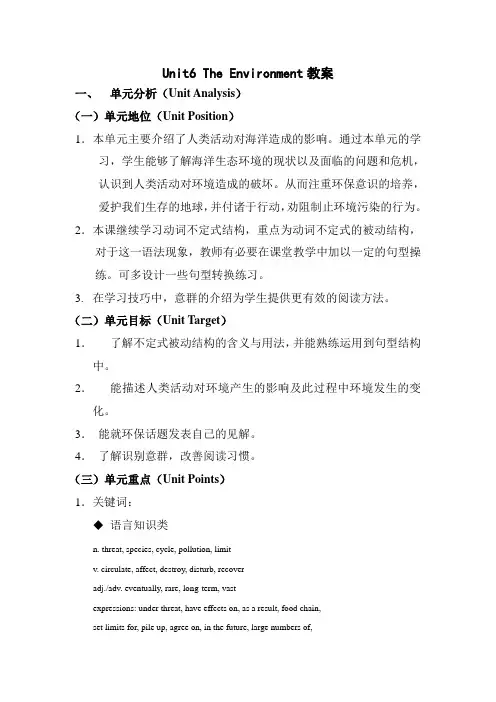
Unit6 The Environment教案一、单元分析(Unit Analysis)(一)单元地位(Unit Position)1.本单元主要介绍了人类活动对海洋造成的影响。
通过本单元的学习,学生能够了解海洋生态环境的现状以及面临的问题和危机,认识到人类活动对环境造成的破坏。
从而注重环保意识的培养,爱护我们生存的地球,并付诸于行动,劝阻制止环境污染的行为。
2.本课继续学习动词不定式结构,重点为动词不定式的被动结构,对于这一语法现象,教师有必要在课堂教学中加以一定的句型操练。
可多设计一些句型转换练习。
3.在学习技巧中,意群的介绍为学生提供更有效的阅读方法。
(二)单元目标(Unit Target)1.了解不定式被动结构的含义与用法,并能熟练运用到句型结构中。
2.能描述人类活动对环境产生的影响及此过程中环境发生的变化。
3.能就环保话题发表自己的见解。
4.了解识别意群,改善阅读习惯。
(三)单元重点(Unit Points)1.关键词:语言知识类n. threat, species, cycle, pollution, limitv. circulate, affect, destroy, disturb, recoveradj./adv. eventually, rare, long-term, vastexpressions: under threat, have effects on, as a result, food chain,set limits for, pile up, agree on, in the future, large numbers of,a great deal, all over the world, cause sb to do, for fun◆交际功能类1)有关海洋:ocean, wave, seawater, marine creature, tropical island, coast, coastal city/area, port, coral reef, shellfish,continental shelf…2)环境破坏:industry, dump, overfishing, acid rain, greenhouse effect, sandstorm, destroy, pollution, pollutant, wastes, chemicals,soil erosion, poison, extinct …3) 环境保护:take care of plants, love animals, preserve wildlife,recycle used things, reduce wastes, collect deadbatteries, say “No” to disposable chopsticks…2.功能:Talking about the pollution and protection of environment(描述“环境污染和环境保护”)●… can have harmful effects on …●… are the most common problems.●One of the biggest threats to … is pollution from…●… be reported to have long been polluted by …●… disturb the natural cycles of …●What we do in one part of the ocean/area can affect another.●… is under threat now.●… is to be done to prevent pollution.3 语法点:本课以不定式的被动结构为重点,在学习过程中,可多进行句子合并,句型操练和主动、被动句式的转换。
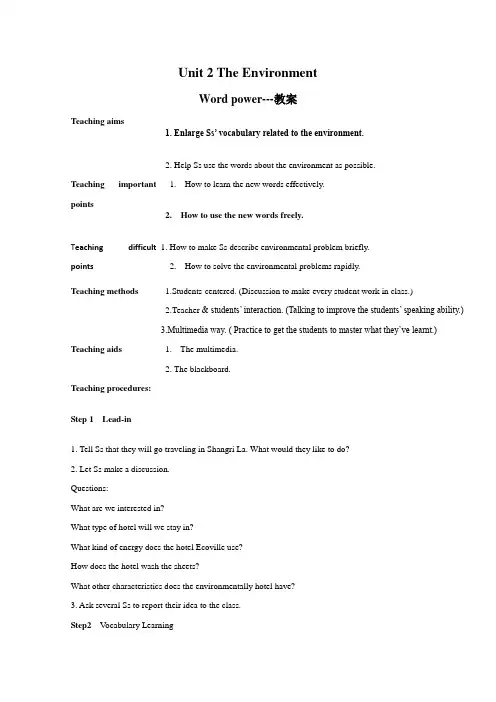
Unit 2 The EnvironmentWord power---教案Teaching aims1. Enlarge Ss’ vocabulary related to the environment.2. Help Ss use the words about the environment as possible. Teaching importantpoints1.How to learn the new words effectively.2. How to use the new words freely.T eaching difficult points 1. How to make Ss describe environmental problem briefly.2.How to solve the environmental problems rapidly.Teaching methods 1.Students-centered. (Discussion to make every student work in class.)2.Teacher & students’ interaction. (Talking to improve the students’ speaking ability.)3.Multimedia way. ( Practice to get the students to master what they’ve learnt.) Teaching aids 1.The multimedia.2. The blackboard.Teaching procedures:Step 1 Lead-in1. Tell Ss that they will go traveling in Shangri La. What would they like to do?2. Let Ss make a discussion.Questions:What are we interested in?What type of hotel will we stay in?What kind of energy does the hotel Ecoville use?How does the hotel wash the sheets?What other characteristics does the environmentally hotel have?3. Ask several Ss to report their idea to the class.Step2V ocabulary Learning1.Read this brochure about a new, environmentally friendly hotel which is opening. (help Ss tolearn the new words.)2.Doing exercise.(help Ss to consolidate them.)3.Ask Ss to label the pictures in part B and try to describe them in a few simple words if possible.(Help Ss improve their speaking abilities)Step 3 V ocabulary Extension1.Ask Ss to focus on Part C on page 27. (help Ss strengthen understand the new words. )2.Ask Ss several questions. (check Ss’ understanding of the passage. )•Who thought of the idea to build in environmentally friendly hotel?• Where did he get his inspiration (idea) ?• What are the differences between Ecoville and other hotels?3.Ask Ss to work in groups & have a competition on words that include the prefix ‘eco-’. Usedictionary if necessary.4.Ask Ss to first complete the note in Part A on page 104 in WB, and then to complete the articlein Part C on the same age.Step 4 Homework1. Try to write an article on some environmental pollution and how to solve the problems.2. Write a guide on how to be an ecotourist.。
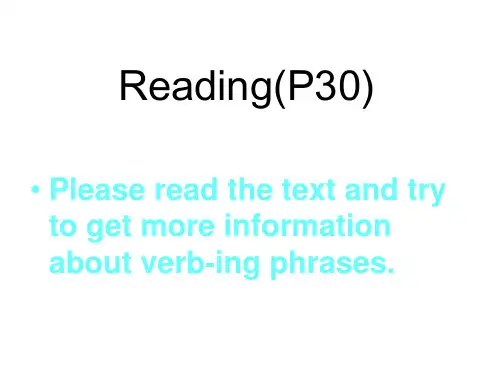
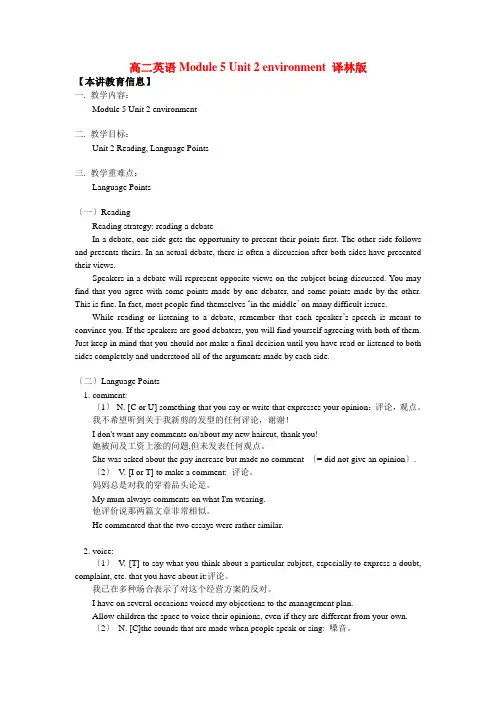
高二英语Module 5 Unit 2 environment 译林版【本讲教育信息】一. 教学内容:Module 5 Unit 2 environment二. 教学目标:Unit 2 Reading, Language Points三. 教学重难点:Language Points〔一〕ReadingReading strategy: reading a debateIn a debate, one side gets the opportunity to present their points first. The other side follows and presents theirs. In an actual debate, there is often a discussion after both sides have presented their views.Speakers in a debate will represent opposite views on the subject being discussed. You may find that you agree with some points made by one debater, and some points made by the other. This is fine. In fact, most people find themselves ‘in the middle’ on many difficult issues.While reading or listening to a debate, remember that each speaker’s speech is meant to convince you. If the speakers are good debaters, you will find yourself agreeing with both of them. Just keep in mind that you should not make a final decision until you have read or listened to both sides completely and understood all of the arguments made by each side.〔二〕Language Points1. comment:〔1〕N. [C or U] something that you say or write that expresses your opinion:评论,观点。
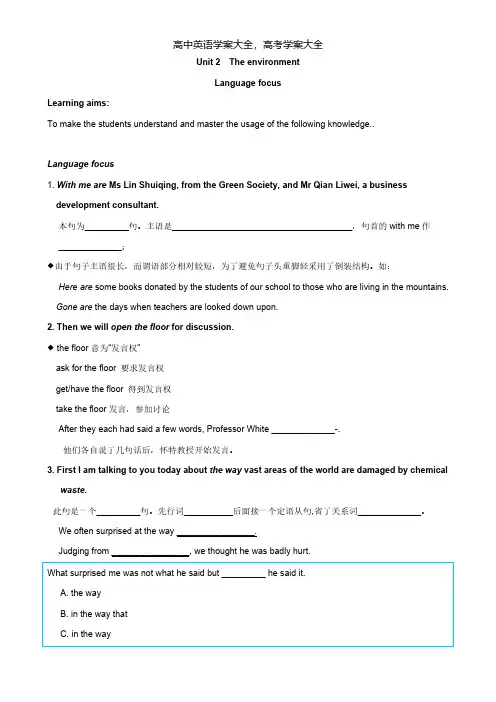
Unit 2 The environmentLanguage focusLearning aims:To make the students understand and master the usage of the following knowledge..Language focus1.With me are Ms Lin Shuiqing, from the Green Society, and Mr Qian Liwei, a business development consultant.本句为_________句。
主语是_____________________________________,句首的with me作_____________;◆由于句子主语很长,而谓语部分相对较短,为了避免句子头重脚轻采用了倒装结构。
如:Here are some books donated by the students of our school to those who are living in the mountains. Gone are the days when teachers are looked down upon.2. Then we will open the floor for discussion.◆ the floor意为“发言权”ask for the floor 要求发言权get/have the floor 得到发言权take the floor发言,参加讨论After they each had said a few words, Professor White _____________-.他们各自说了几句话后,怀特教授开始发言。
3. First I am talking to you today about the way vast areas of the world are damaged by chemicalwaste.此句是一个_________句。
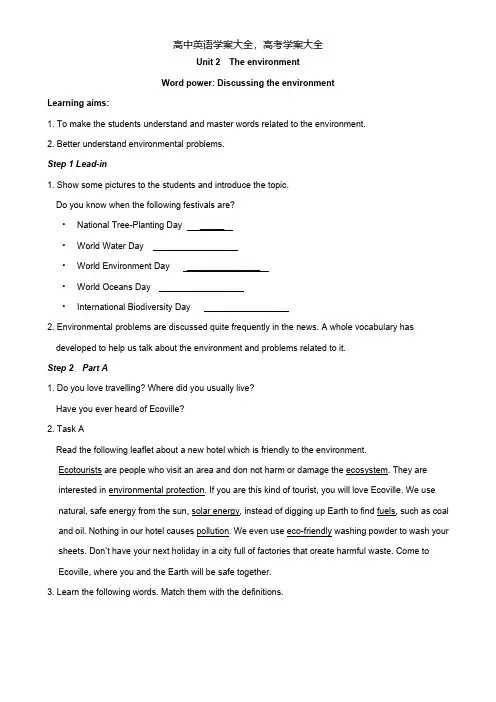
Unit 2 The environmentWord power: Discussing the environmentLearning aims:1. To make the students understand and master words related to the environment.2. Better understand environmental problems.Step 1 Lead-in1. Show some pictures to the students and introduce the topic.Do you know when the following festivals are?•National Tree-Planting Day _____•World Water Day ______________•World Environment Day _______________•World Oceans Day ____________•International Biodiversity Day _____________2. Environmental problems are discussed quite frequently in the news. A whole vocabulary has developed to help us talk about the environment and problems related to it.Step 2 Part A1. Do you love travelling? Where did you usually live?Have you ever heard of Ecoville?2. Task ARead the following leaflet about a new hotel which is friendly to the environment.Ecotourists are people who visit an area and don not harm or damage the ecosystem. They are interested in environmental protection. If you are this kind of tourist, you will love Ecoville. We use natural, safe energy from the sun, solar energy, instead of digging up Earth to find fuels, such as coal and oil. Nothing in our hotel causes pollution. We even use eco-friendly washing powder to wash your sheets. Don’t have your next holiday in a city full of factories that create harmful waste. Come to Ecoville, where you and the Earth will be safe together.3. Learn the following words. Match them with the definitions.Step 3 Part B1. The words above are called compound words .When we talk about things that are bad for the environment, many of the words that we use are compound nouns.2. Guess the meaning of following words, and match them with pictures.•clear-cut logging •acid rain•slash and burn farming •global warming3. Task BUse the compound nouns in the box to label the pictures below. [1]___________________[2]____________________[3]_____________________[4]_ __________________Step 4 Task CHelp Ecoville to write an ad. Fill in the blanks with words you learnt just now.Ecoville, the perfect holiday destination!The idea behind our hotel is (1) ______________ protection. It is safe and fun for the whole family, even Mother Earth!Ecoville was created by Li Zheng, a scientist. He was worried about (2) ___________. He wanted a chance to have a holiday in a beautiful part of the world, but not to cause damage to the (3)________ _ of the area. One night he saw a television show about a village in Africa. The whole village uses(4)_______________ _ from the sun. No (5)______ are burnt in people’s homes. There is no harmful waste from the factories because it is changed back into fuel and used to power the factories.Mr. Li was very excited about this idea, and decided to build Ecoville exactly the same way. Nothing you find in Ecoville causes any harm at all. We built our hotel around the trees----you can relax and be sure that there was no damage done to make space for your room. We even checked to make sure that the materials we used to build were (6)_____________________.So, come and join us, become part of the new generation of tourists, (7)_________, and spend your next holiday in beautiful Ecoville!Step 5 Task D1. The prefix ‘eco-’ means ‘earth’, which comes from Greek.It is used in many words to talk about the environment, such as ‘ecology’ and ‘eco-tourism’.E.g.•If factories harm the environment, they have to pay ____2. Work in groups & have a competition on words that include the prefix ‘eco-’. Use your dictionary if necessary.Homework:1.Review and make as many as words using ‘eco-’ .2.Preview Grammar part.Keys:Step 1 Lead-in1. Show some pictures to the students and introduce the topic. Do you know?•National Tree-Planting Day (12 Mar.)•World Water Day (22 Mar.)•World Environment Day (June 5th )•World Oceans Day (8 Jun. )•International Biodiversity Day (29 Dec.)2. Environmental problems are discussed quite frequently in the news. A whole vocabulary has developed to help us talk about the environment and problems related to it.Step 2 Part A1. Do you love travelling? Where did you usually live?Have you ever heard of Ecoville?2. Task ARead the following leaflet about a new hotel which is friendly to the environment.Ecotourists are people who visit an area and don not harm or damage the ecosystem. They are interested in environmental protection. If you are this kind of tourist, you will love Ecoville. We use natural, safe energy from the sun, solar energy, instead of digging up Earth to find fuels, such as coal and oil. Nothing in our hotel causes pollution. We even use eco-friendly washing powder to wash your sheets. Don’t have your next holiday in a city full of factories that create harmful waste. Come to Ecoville, where you and the Earth will be safe together.3. Learn the following words. Match them with the definitions.Step 3 Part B1. The words above are called compound words.When we talk about things that are bad for the environment, many of the words that we use are compound nouns.2. Guess the meaning of following words, and match them with pictures.•clear-cut logging•acid rain•slash and burn farming•global warming3. Task BUse the compound nouns in the box to label the pictures below.[1]___ acid rain[2]____ clear-cut logging[3]___ global warming[4]_ slash and burn farmingStep 4 Task CHelp Ecoville to write an ad. Fill in the blanks with words you learnt just now.Ecoville, the perfect holiday destination!The idea behind our hotel is (1) _environmental protection. It is safe and fun for the whole family, even Mother Earth!Ecoville was created by Li Zheng, a scientist. He was worried about (2) _pollution. He wanted a chance to have a holiday in a beautiful part of the world, but not to cause damage to the (3)_ ecosystem _ of the area. One night he saw a television show about a village in Africa. The whole village uses (4)__ (solar) energy _ from the sun. No (5)_ fuels are burnt in people’s homes. There is no harmful waste from the factories because it is changed back into fuel and used to power the factories.Mr. Li was very excited about this idea, and decided to build Ecoville exactly the same way. Nothing you find in Ecoville causes any harm at all. We built our hotel around the trees----you can relax and be sure that there was no damage done to make space for your room. We even checked to make sure that the materials we used to build were (6)_ Eco-friendly.So, come and join us, become part of the new generation of tourists, (7)_ ecotourists, and spend your next holiday in beautiful Ecoville!Step 5 Task D1. The prefix ‘eco-’ means ‘earth’, which comes from Greek.It is used in many words to talk about the environment, such as ‘ecology’ and ‘eco-tourism’.E.g.•If factories harm the environment, they have to pay eco-taxes_2. Work in groups & have a competition on words that include the prefix ‘eco-’. Use your dictionary if necessary.。
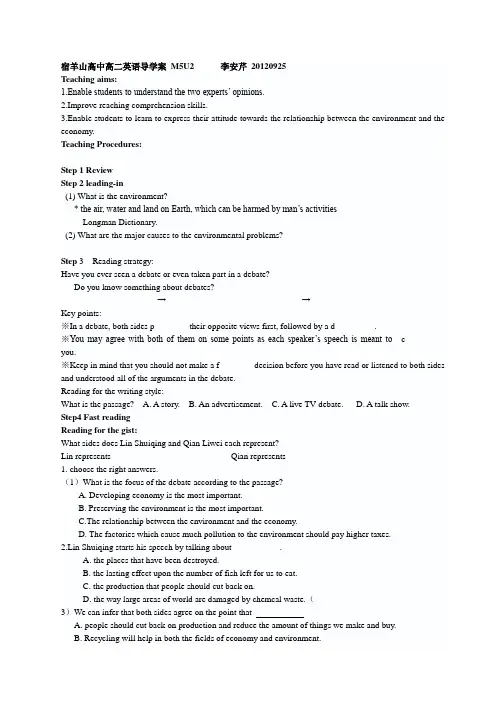
宿羊山高中高二英语导学案M5U2 李安芹20120925Teaching aims:1.Enable students to understand the two experts’ opinions.2.Improve reaching comprehension skills.3.Enable students to learn to express their attitude towards the relationship between the environment and the economy.Teaching Procedures:Step 1 ReviewStep 2 leading-in(1) What is the environment?* the air, water and land on Earth, which can be harmed by man’s activities---Longman Dictionary.(2) What are the major causes to the environmental problems?Step 3 Reading strategy:Have you ever seen a debate or even taken part in a debate?Do you know something about debates?______________________→_______________________________→_______________________Key points:※In a debate, both sides p______ their opposite views first, followed by a d_________.※You may agree with both of them on some points as each speaker’s speech is meant to c_________ you.※Keep in mind that you should not make a f______ decision before you have read or listened to both sides and understood all of the arguments in the debate.Reading for the writing style:What is the passage? A. A story. B. An advertisement. C. A live TV debate. D. A talk show.Step4 Fast readingReading for the gist:What sides does Lin Shuiqing and Qian Liwei each represent?Lin represents _________________ Qian represents __________1. choose the right answers.(1)What is the focus of the debate according to the passage?A. Developing economy is the most important.B. Preserving the environment is the most important.C.The relationship between the environment and the economy.D. The factories which cause much pollution to the environment should pay higher taxes.2.Lin Shuiqing starts his speech by talking about___________.A. the places that have been destroyed.B. the lasting effect upon the number of fish left for us to eat.C. the production that people should cut back on.D. the way large areas of world are damaged by chemcal waste.(3)We can infer that both sides agree on the point thatA. people should cut back on production and reduce the amount of things we make and buy.B. Recycling will help in both the fields of economy and environment.C. It is very important to reduce the amount of jobs.D. We need more effective laws to preserve the environment.4)Lin Shuiqing discusses the subjects about pollution except __________A. industrial wasteB. water pollutionC. RecyclingD. effective laws to preserve the environment5)Qian Liwei thinks production should not be cut back on because ________.A. we need to think more about recycling.B. we should save the environmentC. jobs will be lost. People are more important than fish and trees.D. economic development is bad for the environment..( in C1 on P24)Step 3 Careful reading(1) From what aspects(方面) do the two speakers prove their ideas?C2 on Page 24(2) Give Students time to read the text carefully and fill in the blanks. Debaters Points 3 6Lin Shuiqing (an environ mentalis t) Economicdevelopment is2 for theenvironment.●Many places have beendestroyed and many plantsand animals have died.●Many sea creatures arebeing 4 by fishingboats.●More and more peopleneed more land to live onand more food to eat.●People should cut back on production andreduce the amount of things they make andbuy.●People should think more about7 .●Teach people about 8friendly ways of living.Qian Liwei (an1 ) Economicdevelopmentdoes not haveto be bad fortheenvironment●Many factories andindustries control theamount of pollution theyproduce.●They are careful to spendmoney 5 any damagethey cause.●The people runningfactories are concernedabout the environment.●People should not cut back on the amountof things they produce and buy.●People should produce more things from9 materials and less from materialstaken directly from the environment.●There should be more effective laws topreserve the environment and allow theeconomy to grow at the same time.●Factories 10 the environmentshould have to pay higher taxes.Step 5 Further discussionAfter reading the debate, which speaker do you agree with? Which speaker is more powerful to convince you? Tell the reasons.I agree with Mr. Lin Shuiqing. In my opinion, the environment is more important than the economy.Firstly,_________________________________. Secondly,_______________________________ .To sum up, we should ______________________. I agree with Mr. Qian Liwei. In my opinion, we shouldn’t stop developing economy to protect the environment.Firstly,___________________________________ Secondly,_________________________________ To sum up, we should ___________________.Reading strategy;One side presents his points.The other side presents his points.Open discussion Present discussion convince finalC Environment economy CDBDC Economist Bad arguments damaged repairing suggestions recycling environmentally recycled harm。
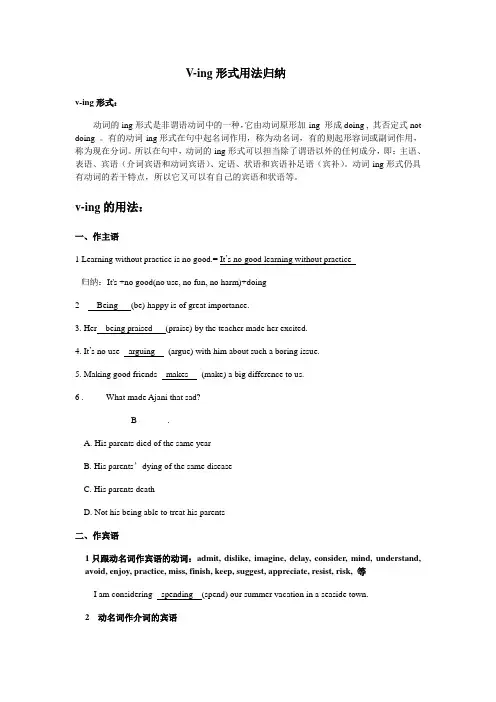
V-ing形式用法归纳 v-ing形式: 动词的ing形式是非谓语动词中的一种,它由动词原形加-ing 形成doing , 其否定式not doing 。有的动词-ing形式在句中起名词作用,称为动名词,有的则起形容词或副词作用, 称为现在分词。所以在句中,动词的-ing形式可以担当除了谓语以外的任何成分,即:主语、表语、宾语(介词宾语和动词宾语)、定语、状语和宾语补足语(宾补)。动词-ing形式仍具有动词的若干特点,所以它又可以有自己的宾语和状语等。
v-ing的用法: 一、作主语 1 Learning without practice is no good.= It’s no good learning without practice 归纳:It's +no good(no use, no fun, no harm)+doing 2 Being (be) happy is of great importance. 3. Her being praised (praise) by the teacher made her excited. 4. It’s no use arguing (argue) with him about such a boring issue. 5. Making good friends makes (make) a big difference to us. 6 . -------What made Ajani that sad? -------- _____B_______. A. His parents died of the same year B. His parents’dying of the same disease C. His parents death D. Not his being able to treat his parents 二、作宾语 1只跟动名词作宾语的动词:admit, dislike, imagine, delay, consider, mind, understand, avoid, enjoy, practice, miss, finish, keep, suggest, appreciate, resist, risk, 等
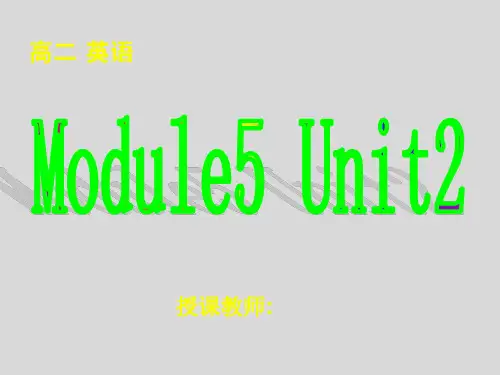
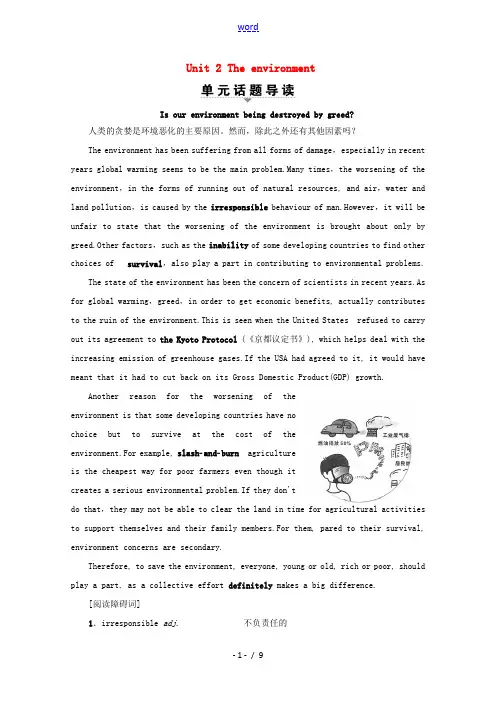
Unit 2 The environmentIs our environment being destroyed by greed?人类的贪婪是环境恶化的主要原因。
然而,除此之外还有其他因素吗?The environment has been suffering from all forms of damage,especially in recent years global warming seems to be the main problem.Many times,the worsening of the environment,in the forms of running out of natural resources, and air,water and land pollution,is caused by the irresponsible behaviour of man.However,it will be unfair to state that the worsening of the environment is brought about only by greed.Other factors,such as the inability of some developing countries to find other choices of survival,also play a part in contributing to environmental problems.The state of the environment has been the concern of scientists in recent years.As for global warming,greed,in order to get economic benefits, actually contributes to the ruin of the environment.This is seen when the United States refused to carry out its agreement to the Kyoto Protocol (《京都议定书》), which helps deal with the increasing emission of greenhouse gases.If the USA had agreed to it, it would have meant that it had to cut back on its Gross Domestic Product(GDP) growth.Another reason for the worsening of theenvironment is that some developing countries have nochoice but to survive at the cost of theenvironment.For example, slashandburn agricultureis the cheapest way for poor farmers even though itcreates a serious environmental problem.If they don'tdo that,they may not be able to clear the land in time for agricultural activities to support themselves and their family members.For them, pared to their survival, environment concerns are secondary.Therefore, to save the environment, everyone, young or old, rich or poor, should play a part, as a collective effort definitely makes a big difference.[阅读障碍词]1.irresponsible adj. 不负责任的2.inability n. 无能3.survival n. 生存,幸存4.theKyotoProtocol《京都议定书》5.slashandburn adj.刀耕火种的6.definitely adv. 肯定地[诱思导读]阅读短文,回答下列问题。
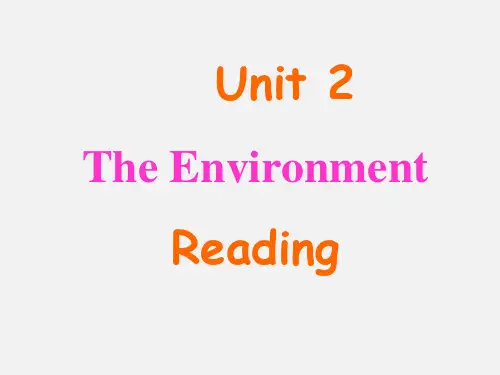
高中英语真题:M5Unit2Theenvironment重点短语1. natural disaster 自然灾害 2.damage the environment 破坏环境3. ask around 四下询问/打听 4. be beneficial to…对。
有益5. in particular 尤其,特别 6. at the same time 与此同时7. environmentally friendly 环保 8. lay eggs 产卵9. be bad for…对```有害 10. what if…要是```该怎么办11. in the long run/term 从长远来看 12.dig up 掘地/起,发现,收集13.solar energy 太阳能 14.global warning 地球气候变暖15. deal with…处理,涉及 16.in the form of…以```的形式17. under way 在进行中 18. replace …with…用```代替19.in the form of…以```的形式 20.raise concern 引起关注21.focus on…以```为中心,集中于 22.pick out 找出,挑选出,辨认出,理解23.be home to sth ```的所在地/发祥地/栖息地 24. advise sb. on sth.出主意,就```提出建议25.35.pick out 找出,挑选出,辨认出,理解 26.have a long way to go 有很长的路要走27.cause/do damage to sth造成对```的损害/损伤 28.have effects on…对```产生有影响29.make an effort to do sth. 作出努力做某事 30.illegal hunting of animals非法捕杀动物31.the key to solving the problem 解决问题的关键32.take steps/measures/ action to do 采取措施做某事33. have a lasting effect on/upon…对```有持久的影响34.encourage sb. to do sth./ into doing sth. 鼓励某人做某事.35. as/so far as sb./sth. is concerned 就```来说/就```而论36. large numbers of 大量的(复名)a large number of …= a great/good many…= quite a few…= s cores of… +复名a great deal of…= a large amount of…= large amounts of…= quite a little 不可数名plenty of = a large quantity of = large quantities of = a lot of = lots of…不可数/复名37.open the floor 自由发言 have/get/obtain the floor有/取得发言权 take the floor发言38.in addition 另外,除了 =besides in addition to 除。
1 高二英语复习学案 M5U2 The environment 第一部分 基础知识巩固 I. 单词拼写 1. The two sides had a fierce d____________ before they reached an agreement. 2. There are no factories in the area, so there is no i____________ pollution. 3. These measures are very b______________, you’d better take them. 4. It is o______________ that he knows nothing about what has happened, you may tell him now. In order to study the s___________ in Russia, Marx began to learn Russian in his sixties. 6. The________________(环境)pollution here is very serious, which the government should not take no notice of. 7. Frankly speaking, I did it out of my ______________(愿意). 8. ______________(除了)remembering new words, we should do more reading aloud in the morning. 9. I am glad to see many of you have made ____________(稳定)progress this term. 10.There are a variety of gases in the _________________(大气). 11. What Liu Xiang did at the Olympic Games excited the whole n__________. 12. Using the right hand to shake hands is a c____________. 13. They were talking across the garden f__________. 14. Because of the heavy rain the l_______ of the lake has risen 6 inches. 15. At what age does an elephant reach full g_______? 16. Too much work and too little rest often _______(导致) to illness. 17. You will _________(危及) your health if you work so hard. 18. Plastics today contribute to a wide ________(范围) of industries. 19. That’s just because you can’t __________(欣赏) music. 20. The ________(使用) of some English words are difficult to learn. 21. Now it’s time _____________(自由发言),you may air your opinions freely. 22. I am afraid we will have to stop at the gas station, we___________ (用完) the oil. 23. Which of the s______________ of the four is true according the passage. 24. We shall start upon the a__________ of the last guest. 25. Most students are working hard, some of them have already made r_____ progress. 26. His efforts finally _________________(导致结果) his great success. 27. Some naughty boy can’t _________(集中)what the teachers say in class, they are often absent-minded. 28. As is known to all ,it is ___________(非法的) to hunt wildlife. 29. Some animals have several ________(胃). 30. His army ________________(装备)the weapons made in Germany . 31. Students are required to watch c___________ when doing chemical experiment. 2
32. He can earn money himself, he no longer needs to___________(依靠) his parents. 33. Now in the USA ,he has come to realize the ____________(重要性)of English. 34. The area of land that is _______________(可耕的) is comparatively small. 35. It is a s__________ to cheat in the exams. II. 课文短语填空 1. We will _________ ________ ___________ (自由发言) for discussion at the end of the debate. 2. It is our duty to try to _________ ______ _________ (减少) production and reduce the amount of things we make and buy. 3. They think of greedy businessmen _________ _________ __________ _________________(躲避社会责任) and only worrying about money. 4. I am sad that the young people of today do not _________ _________ (打扫干净) after themselves before they leave the park. 5. We need to use our raw materials in the best possible way; otherwise, they will be soon _________ ________ (用尽). 6. Hundreds of people __________ ________ (排队等候) to be among the first to view modern paintings. 7. Satellites are used to __________ ___________(挑出) areas likely to be affected by desertification. 8. Two special government projects are also ___________ ___________(进行中). 9. We still have a long way to go to solve all the problems ________ ________ __________(有关) the Yangtze River. 10. Many people ________ this change _________ (将…归咎于) gases such as carbon dioxide. 11. Many other human activities also ________ _________ (排放) carbon gases. 12. The whole meal was good but the wine __________ ___________(尤其) was excellent. 13. Two decades from now you will find a sense of satisfaction knowing that you _________ ________ ___________(尽自己职责) to help solve the problem of climate change. III. 选词填空 (注意使用正确的形式) voice, wipe out, live on, cut back on, expand, run, pay, tax, lay, approach
1. Unlike tigers, deer ___________________ grass. 2. He works very hard, of course he __________________well 3. We should ______________hares for they are destroying the plants. 4. The old worker can not _________this machine, made in Japan. 5. It’s your turn to ___________ your opinion. 6. The products _________ heavily ________ when they are imported. 7. Some countries have decided to ________________ the number of army. 8. The company will ___________ its business by opening two more branches 9. Autumn _______________, you may put on more clothes if necessary.